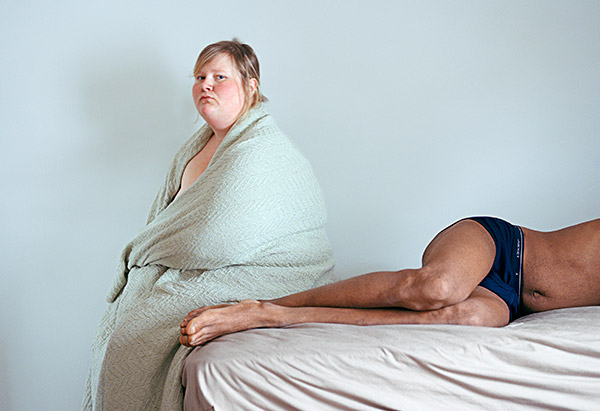Coming Into Focus: 3 Photos That Will Change How You Think About Your Body
A photographer loses the inspiration that fueled her work—and finally finds what she was searching for all along.

Photo: Jen Davis, Courtesy of Lee Marks Fine Art
Above: Davis shot this photo of herself in 2006. It's one in a series of self-portraits taken over the course of a decade.
If you sat down with an accomplished self-portrait photographer, the last thing you might expect to hear is "I'm a bit uneasy in my skin right now." But that's what Jen Davis tells me as she eyes the voice recorder I've set between us on her living room couch. She tucks her legs beneath her. "In fact," she says, "I have to admit I'm a little freaked out."
Davis's inhibitions are understandable. She spent ten years creating striking, seductive images of her own 269-pound frame, and now, suddenly—with the top portion of her stomach cinched by a silicone Lap-Band and the extra weight melting away—her subject is disappearing before her eyes.
As we chat about her past and her work, Davis laughs easily, and before responding to a question, she wrinkles her forehead so you can practically see her thinking. She's beautiful, with bright blue eyes and the kind of straight blonde hair the rest of us have to fake. But because she's been obese most of her life, Davis is racked with insecurities. Since she was a teenager, she has preferred to interact with the world from a distance, through the lens of a camera. During her high school years, she was constantly snapping photos of kids in the hallways and the cafeteria as a photographer for the yearbook. "I used the camera to gain access, to communicate," she says.
But the pictures she took outside school—abandoned cars on a nearby reservation; the teenage boys she pined for as they jammed with their garage bands—reflected her growing sense of isolation. Over time she began to focus on capturing the loneliness in others. "It was like I was taking self-portraits," she says, "except I wasn't in them."
When Davis was 23, her work took a turn: Reading through her old journals, she was struck by the fact that her grievances—being overweight, missing out on romantic love—had been the same for years. Maybe, she thought, if I turn the camera on myself, I might shake loose whatever is holding me back. In the first self-portrait she ever snapped, Davis sits on a bamboo mat on the sand, on spring break in Myrtle Beach, her one-piece bathing suit concealed by a green cover-up and black shorts; the friends around her are slender in their bikinis and swim trunks, and the uneasiness on her face is palpable.
Next: Davis's decadelong project
If you sat down with an accomplished self-portrait photographer, the last thing you might expect to hear is "I'm a bit uneasy in my skin right now." But that's what Jen Davis tells me as she eyes the voice recorder I've set between us on her living room couch. She tucks her legs beneath her. "In fact," she says, "I have to admit I'm a little freaked out."
Davis's inhibitions are understandable. She spent ten years creating striking, seductive images of her own 269-pound frame, and now, suddenly—with the top portion of her stomach cinched by a silicone Lap-Band and the extra weight melting away—her subject is disappearing before her eyes.
As we chat about her past and her work, Davis laughs easily, and before responding to a question, she wrinkles her forehead so you can practically see her thinking. She's beautiful, with bright blue eyes and the kind of straight blonde hair the rest of us have to fake. But because she's been obese most of her life, Davis is racked with insecurities. Since she was a teenager, she has preferred to interact with the world from a distance, through the lens of a camera. During her high school years, she was constantly snapping photos of kids in the hallways and the cafeteria as a photographer for the yearbook. "I used the camera to gain access, to communicate," she says.
But the pictures she took outside school—abandoned cars on a nearby reservation; the teenage boys she pined for as they jammed with their garage bands—reflected her growing sense of isolation. Over time she began to focus on capturing the loneliness in others. "It was like I was taking self-portraits," she says, "except I wasn't in them."
When Davis was 23, her work took a turn: Reading through her old journals, she was struck by the fact that her grievances—being overweight, missing out on romantic love—had been the same for years. Maybe, she thought, if I turn the camera on myself, I might shake loose whatever is holding me back. In the first self-portrait she ever snapped, Davis sits on a bamboo mat on the sand, on spring break in Myrtle Beach, her one-piece bathing suit concealed by a green cover-up and black shorts; the friends around her are slender in their bikinis and swim trunks, and the uneasiness on her face is palpable.
Next: Davis's decadelong project



